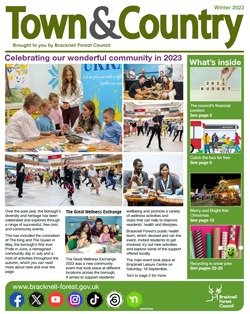
Bracknell Forest is proud to recognise and support Lesbian, Gay, Bisexual and Transgender + (LGBT+) History Month.
Celebrated every February across the UK, LGBT+ History Month is for everyone. It can also be called LGBTQ+ History Month. The Q references the contributions of those defining themselves as queer. Organisations are encouraged to provide a safe space for LGBT+ people and celebrate their achievements.
Aims of the month
The aim of LGBT+ History Month is:
- to increase the visibility of LGBT+ people, their history, lives and experiences in the wider community
- to raise awareness and advance education on matters affecting the LGBT+ community
- to make educational and other institutions safe spaces for all LGBT+ communities
- to promote the welfare of LGBT+ people, by making sure the education system recognises and helps LGBT+ people to achieve their full potential
The theme this year is Medicine - #UnderTheScope. This celebrates LGBT+ people’s contribution to the field of medicine and healthcare, both historically and today.
The campaign aims to show the great work of LGBT+ staff in the NHS and other healthcare settings. It also highlights the history of how the LGBT+ community has experienced healthcare. It has been complicated and the community still face health inequalities.
People will also be encouraged to look ‘under the scope’ and listen to LGBT+ people’s lived experiences. Only by listening and learning can we progress real, positive change.
Section 28
This year also marks 36 years since Section 28 was introduced and 21 years since it was abolished. Section 28 is the overarching name for legislation that meant local authorities could not publish or promote positive descriptions of LGBT life. This extended to schools as well.
Section 28 was seen as a regressive piece of legislation introduced by the Thatcher government of 1979-1990. It stated that councils should not ‘intentionally promote homosexuality or publish material with the intention of promoting homosexuality’ in its schools or other areas of their work.
Through campaigning, this was repealed in 2003 but it remains an important part of LGBT+ history.
You can get involved by visiting the LGBT+ History Month website and by following LGBT+ History Month across their major social media channels.
